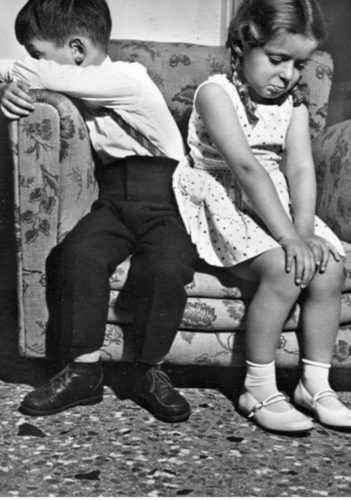
Children often highlight the reality of the human experience in a kind of stark relief not obtained by adults. Young ones are more honest and less inhibited. Small people are less self-curated than those of us with more decades behind us. (At least until we get up into our seventies and eighties and realize it was all absurd. A topic for another day.)

I have four urchins living under the roof with me, I am a school administrator and teacher, and I minister to various young folks at church. And, I learn so much. They offer profound insight, a different and precious perspective, and they also expose their own sin in funny and full ways. But, I don’t always report my interactions, because it’s not my place to tattle.
But, sometimes it’s too good. I had an interaction with two of my own children recently, and it highlighted for me, as it often does, a sin pattern present in my own life. And I suspect, based on my newsfeed, I am not alone.
One morning, while I was happily working on something adult and intellectually stimulating, I was presented with much wailing and gnashing of teeth. I quickly discovered that my 4.5-year-old daughter had become angry and actually (and quasi-skillfully) punched her 9-year-old brother in the eye. Both of them appeared before me, just judge that I am not, and requested mediation. (Or screamed a lot until I paid attention.)
 The mediation commenced thus:
The mediation commenced thus:
Her: “YES!”
I like this style really. Rather than what not to do, I think this is an example of exactly what to do. Just admit it. How refreshing. Yep. I did it. We know from our brothers and sisters in twelve step programs that the first step is always admitting that you have a problem. Hi. I am a brother-puncher.
Me: “Are you ever allowed to punch your brother?”
Her: “UUGGGGGGHHHHH. NOOOOOO. I AM NOT.”
The law makes us mad. And, hopefully, that anger drives us to repentance. In fact, our Creator gave us the law to show us our need of reconciliation. Without the “no brother punching” rule, little bit can’t articulate her need. Without the law, we stand, and what we need most is to be driven to our knees. But that doesn’t save us from being mad about it. Of course the conflict within our souls between the old man and the new man makes us exasperated. We want to scream, “Can’t it just be over? Can’t it be the case that either I am allowed to punch my brother or that I don’t punch my brother? One or the other — you pick, Mama!” You hear the Apostle Paul scream his own version of “UGH” right there in Romans 7. He’s a bit more articulate, but it’s the same thing. Why do I do the very thing I hate? Wretched man that I am! Ugh. The law is not abolished by our railing against it, but rail we do.
Her: “UGH. YES.”
She knows. She knows the pathway to relief, but she hates it. Because asking forgiveness is exhausting. It is terrifyingly vulnerable (What if he says no?), and it is humbling (I need something I don’t have and can’t provide for myself.)
 Me: “Go ahead and ask him; he’s listening.”
Me: “Go ahead and ask him; he’s listening.”She hated even saying it. Misery.
Up until this point, this is a daily occurrence. Not the eye-punching — that’s pretty exciting. But the sinning against one another, needing to ask for forgiveness, and begrudgingly so doing. Mediating these type interactions is pretty much 13% of my time. Women really can have it all, folks. But, here is where it gets less ordinary:
Brother, in response to her mumbled question: “Yes…”
Her, to Me, hands thrown out in the universal Stance of the Righteously Indignant: “Ugh. He did not say that well. You could tell. He blinked his eyes like this and he said it bad. So bad. He didn’t do the forgiving well. He didn’t. Ugh. He’s terrible.”
(Now, I’ll give her this. This particular son of mine does not take all his opportunities to affirm his fellow man. His “yes” did not make me teary eyed at the beauty of the gospel or anything. But I don’t think there was a response in the world that would have satisfied the beast.)
This is our pattern. First, we sin; second, we don’t like that we sinned (and we get mad at the law, because it’s making it really hard to lie to ourselves about said sin); third, if we’re blessed, we recognize repentance as the road out; fourth, we sabotage the reconciliation, because the old man doesn’t actually want it.
We’ll take one of two options — either no law (which affirms the delusion of no sin) or we’d like justification under the law (which affirms the delusion of a solution to sin other than grace).
Simple reliance on grace offends our pride, and we prefer our pride to genuine reconciliation. All I’m going to get is a damn “Yes…”? No thank you. I’ll stick to huffing and puffing and enjoying my status as brother-puncher. He sucks after all. Ha. I win.
However, there is good news. God’s grace to us is not reliant on our graceful acceptance of it. He doesn’t take back His yes, no matter how many times we throw our hands out in indignation. The Bible tells me so. I’m happy to say I cannot ruin the treasure presented at the cross, even when, in the face of God’s Yeses and Amens, I say Ugh over and over and over again.
 But, my young ones do show us something that is relevant. We have horizontal relationships in addition to our vertical one. And those are legitimately important. We have people in addition to our God, and we can heap grace upon their heads if we can thread the needle of reconciliation.
But, my young ones do show us something that is relevant. We have horizontal relationships in addition to our vertical one. And those are legitimately important. We have people in addition to our God, and we can heap grace upon their heads if we can thread the needle of reconciliation.
We are blessed beyond measure if we make it to the asking of forgiveness part. We are nearing the summit of Everest if we can offer a Yes when we have been the one punched and someone seeks our forgiveness. But there is yet one more precipice into which we may fall. One more way to derail the project.
We can refuse to accept the offered forgiveness. We can throw out our hands and declare all the things wrong with the great gift offered to us by our fellow man. He didn’t say it right. I could tell in his eyes. He didn’t mean it. He didn’t really give me, in the absolute best way possible, that free thing that I didn’t deserve in the first place. We can, like my precious baby child, choose indignation over humility, putting ourselves back under the law in relation to our fellow man, instead of embracing the rarely found moment of grace with one another.
Instead, may we try to put our hands by our sides and merely accept. Full stop. Forgiveness is more precious than gold, and as my southern mother always taught me, a simple “Thank you” goes a long way.
We aren’t going to stop sinning. (Ugh. I know.) By God’s grace, we’re not going to stop seeking forgiveness and offering it when it is sought from us. May we make the final ascent, walking the narrow path of reconciliation, by also receiving forgiveness, though it will be flawed, without demanding that it be more than mere humans can give.

COMMENTS
6 responses to “The Narrow Path of Reconciliation”
Leave a Reply













So good!! Thanks for this, ALF!!
Thanks so much, Charlotte!
Great insights and lots of lessons.
To single out one: the sinner (puncher) tries to play the hurt victim. I.E., the sinned against (punched) deserved to be punched because he is incapable of genuine forgiveness. Not overlooking sin, pretending it doesn’t happen, is made to look worse than the act of sin itself. I read this sort of justification in the news daily. It has become the grist of many of our political arguments.
There are some good insights in this article. I’d like to share some observations. Please receive them as such and not as a judgmental criticism:
I’m all for reconciliation whenever possible. However the article in its attempt to encourage reconciliations, which is a wonderful thing, does not proclaim Good News. It doesn’t provide the gospel as the final word and doesn’t give hope for those for whom the idea of reconciliation might be a matter of life and death and emotional heath as they have been used and abused. This would be a hard read for them, it leaves them without hope.
When the author says: “We can, like my precious baby child, choose indignation over humility, putting ourselves back under the law in relation to our fellow man, instead of embracing the rarely found moment of grace with one another.” – This talks about grace and yet it is really law (I am not judging, just telling the fact that “love your enemies” is law).
Also when it says: “Instead, may we try to put our hands by our sides and merely accept. Full stop. Forgiveness is more precious than gold, and as my southern mother always taught me, a simple “Thank you” goes a long way.” – This too is: “Do this and live”
Also when it says: “We aren’t going to stop sinning. (Ugh. I know.) By God’s grace, we’re not going to stop seeking forgiveness and offering it when it is sought from us. May we make the final ascent, walking the narrow path of reconciliation, by also receiving forgiveness, though it will be flawed, without demanding that it be more than mere humans can give.” – This “May we take the “final ascent”” sadly sounds like ladder theology….How hard it is to preach the gospel as the final word.
We won’t stop sinning, that’s true. Thank God for Jesus who covers all of our failures at reconciliation, forgiving and receiving forgiveness from our fellow men. We need that hope or we are lost.
Grace & Peace in Christ!
Hi!
I really appreciate you taking the time to express these concerns, and you have hit upon a very common tension in the Christian life. I am so sorry that you didn’t hear good news proclaimed here. I do always want to say – and hoped to have here (“God’s grace to us is not reliant on our graceful acceptance of it. He doesn’t take back His yes, no matter how many times we throw our hands out in indignation.”)- that grace is the end, and the story is over.
Jesus covers all our sins and there is nothing we can do to either earn or unearn that forgiveness.
However, in my experience, there are things that we can do to both give and receive earthly grace, which was the type of reconciliation to which there actually is ascent. There is no ladder with God, but there is work among the brethren.
Our human relationships do have an element of “do this and live”, right? It is such a hard tension – one Christians know and feel profoundly. The victory of grace over law absolves us of all requirements in the eyes of God – the gospel is the final word. But we are still given the privilege to love and be loved by sinners – and as we seek to love and be loved, striving for human reconciliation is good work, I think. There is no work for reconciliation with the Father, but there is good work to be done here on earth.
The tension is hard to live in – and write about – and I could definitely be missing a piece of the conversation!
Again, I apologize if there was not hope found here by a reader.
Rest in Jesus!
AnnLowrey
Ms. Foster,
Thank you so much for your very gracious response. I wrote that comment quick wanting to be brief, but in the process what I wrote came out too black and white and I didn’t provide much explanation. I’m sorry! I appreciate your kind response. Please allow me to explain:
I have no problem with proclaiming the Law, just not as a motivation for good works or to encourage of our abilities rather, I believe the Law shatters any category in our abilities. I do appreciate the reference you made about the Cross at some point in the article, but I later lost you as I kept reading especially in your last 3 concluding paragraphs. Your piece had some good insights; I especially appreciated the one about receiving forgiveness, saying that when we receive forgiveness from our neighbor we should not try to qualify it in order to decide if we can receive it or not, but instead, we should just simply receive it. I agree. However, the article in the end leaves the reader with himself/herself (as least it was my experience) and not with the Work of Another for us as the final word over us in this matter of reconciliation with our neighbor. The article seemed to give too much power to the Christian and then leaves him there. I could be totally misreading or misunderstanding you. I apologize if that’s the case.
I know that in writing an article or a blog post, it’s not always possible for the author to cover every aspect of things, I understand that, yet I missed that the article didn’t consider that sometimes reconciliation is not always possible. As we see in Scriptures: “If possible, so far as it depends on you, live peaceably with all” (Ro.12:18). There are countless cases that it does not depend on us, so we trust and rest in the peace of God and the Good News is that Jesus calls us: “Come to Me all of you who are weary and heavy laden and I will give you rest”. In such cases, if God produces a miracle in our enemies’ minds and souls and a road to reconciliation opens up, then we can take it and give them grace because we have received grace. I’m only talking about reconciliation here, not forgiveness, as our forgiving and loving our enemies does not depend on their repentance, or at least it shouldn’t. But again, it’s hard to cover everything about a subject, I do understand that.
On regard to reconciliation to our neighbors, I believe the answer for it and motivation is found in the Gospel alone and not in the law or a mixture of the two, nor in the idea that there is work left to be done by us among the brethren; but that the answer is simply the reality that we have been already reconciled to the Father in Christ by what He alone has done for us. The Gospel unlocks/frees us to do it because God gives us the faith to believe that we are loved. The gospel produces a respond in faith in this matter of reconciliation (as with any other aspect of our lives), although our response will be always imperfect in this life, yet in the end, a response born our faith in Christ on this matter has far more to do with Christ for us and Christ in us, as the Holy Spirit continues to give testimony of Christ to us. In other words, for my heart to respond –in faith—faith in Christ on this, God reminds me that Jesus as my Substitute loved his neighbor and reconciled with his neighbor and his enemies in my place, for me, and gave me that righteousness and at the Cross He paid for, forgave and covered all of my failures at reconciliation with my neighbor, including my best attempts and “successes” at it and because of His resurrection, He now holds -all things already- reconciled in His hands, including our broken relationships. It’s all done! It is only on this solid ground of this hope that I could ever desire or even attempt any reconciliation, or grant forgiveness or receive forgiveness from my neighbor by faith in Christ to the Glory of God. In other words, faith has to be present in our works; otherwise they are not good works. And as we know, faith is not a work of man, but a gift from God, then, we can conclude that it is all grace. To grasp this, our eyes have to be open to the reality of the abysmal fall we all fell in Adam, that is manifested in our inability to obey the law and open to the reality of the Old Adam in us, that is always trying to get any glory he can get and it is only faith alone in Christ alone that opposes him. The Old Adam loves to make fig leaves out of anything, including in this case, ‘my granting forgiveness to my neighbor, receiving forgiveness from my neighbor and reconciling with my neighbor.’ Simply because, by nature, our hearts are set/wired to work for our own righteous for our own glory not only before God, but also before men. The Gospel provides the eyes to see this and continually rescues us from ourselves. That is why we refuse to know nothing but Christ and Him Crucified even including our dealings with one another. Therefore, any form of “reconciliation with our neighbor” that happens disconnected from the hope that we have in Christ, is short lived, it’s a delusion, and here is why: “I have been crucified with Christ. It is no longer I who live, but Christ who lives in me. And the life that I now live in the flesh, I live by faith in the Son of God, who loved me and gave himself for me”. (This verse touches our earthy life far more than we can ever imagine). Therefore, in the matter that concern us here, in this new life that I now live -in the flesh- any genuine reconciliation, granting of forgiveness or acceptance of forgiveness from my neighbor that is born out of faith in Christ for me, does not happen in the place where we are told “do this and live”. It doesn’t happen in a place where we are told “choose humility over holding grudges or indignation”, no. It only happens in the place and solid ground where we are reminded that everything has already been done for us by Jesus, including reconciliation with our neighbors, as that has been done for us too. So thank God for Jesus! Therefore, any reconciliation with our neighbor is nothing but a Gift. A gift given to us and to our neighbor by God. This Substitution and Imputation of Righteousness by Jesus to us, that touches any area of our lives, including the area of reconciliation with our neighbors is what I thought was missing in the piece you wrote and that is why I said, the article left me with myself and not with ‘Christ for me’ at the end. We got no other resource for this matter of reconciliation with our neighbor or any matter of life but Jesus Christ Himself for us, who He is and what He alone has done; because the Christian life is a life of faith, faith in the One the Father has sent for us and that is were good works happen. So, on regard to the observation I made when you say: “May we make the final ascent, walking the narrow path of reconciliation”, the problem comes when those words find the words “do this and live” and are put together, even if it is just in relation to our neighbor only, what results begins to sound more like theology of glory than theology of the Cross. I say this with much respect to you.
Regarding the tension of the Christian life you referred to, I understand what you mean, in fact, I’ve heard it all my lie; yet I would suggest that if there’s a tension is not caused by the need having to do good works in this life; but rather by unbelief. Unbelief in the work of Christ for us. Unbelief in the sufficiency of that work for us. Unbelief in the only Person and only message that resurrects, unlocks and frees our hearts to love God and each other. Unbelief in the Gospel. It’s why we desperately pray “Lord I believe, help my unbelief!” This is why I said that there is not ascent or climbing, because there’s only faith. Faith in the One who loved us and gave Himself for us. There is no ladder with God, as we well know and agree; but there is also not ascent or ladder with men either. There’s only a life of faith, there’s only gifts that are received by faith in the One who loved us. This faith produces love for our neighbor and love for our Rescuer. Now, I‘m not saying do nothing for your neighbor; but what I’m saying is this: Believe the Gospel which alone produces love for your neighbor and reconciliation with your neighbor.
I apologize for the lengthy comment. I honestly hope that my first comment didn’t discourage you or this new comment either. If I did, I’m very sorry! Thank you so much for encouraging me to rest in Jesus in your response. May He help me so and increase my faith and yours too in Him alone!
Grace & Peace!